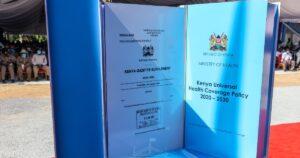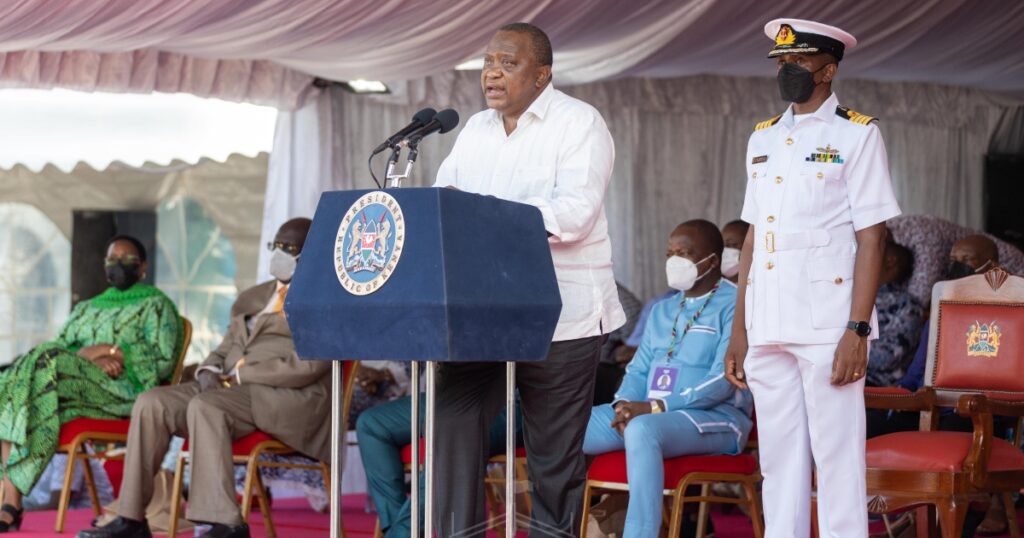- Kenya’s President Uhuru Kenyatta has unveiled the Universal Health Coverage (UHC) national scale-up and called on Kenyans to register for the National Health Insurance Fund (NHIF)
- Kenyatta said the programme was started in the country in 2013 with the highly acclaimed free maternity programme dubbed “Linda Mama”, which currently benefits over one million mothers annually
- On health infrastructure, President Kenyatta said the government’s investments since 2013 had seen an increase of 43 per cent in public health facilities from a stock of 4,429 facilities in 2013 to 6,342 currently
Universal Health Coverage for Kenyans
Kenya’s President Uhuru Kenyatta has unveiled the Universal Health Coverage (UHC) national scale-up and called on Kenyans to register for the National Health Insurance Fund (NHIF).
The President affirmed the government’s commitment to spreading the benefits of UHC across the country through the development of a focused policy to accelerate its implementation.
“My administration has developed the Universal Healthcare Coverage Policy, covering the period 2020 – 2030, to guide the acceleration of the progress in attaining Universal Health Coverage,” the President said.
The President was speaking at the Port Reitz sub-county hospital in Mombasa, where he said the COVID-19 pandemic has brought to bear the urgent need for the country to upscale implementation of the UHC.
“Under this pillar, we seek to eradicate the ‘poverty of dignity’ and transition our nation into an era where no Kenyan should be forced to choose between medical bills and other essential needs,” President Kenyatta said.
On UHC, the Head of State said the programme was started in the country in 2013 with the highly acclaimed free maternity programme dubbed “Linda Mama”, which currently benefits over one million mothers annually.
He outlined various initiatives the Government has put in place to ensure the successful implementation of UHC, including investment in health infrastructure and development of a digital health platform to support the effective monitoring of the health sector.
Uhuru’s big four: Way forward for universal healthcare
On health infrastructure, President Kenyatta said the government’s investments since 2013 had seen an increase of 43 per cent in public health facilities from a stock of 4,429 facilities in 2013 to 6,342 currently.
“In the same period, our ICU capacity has increased by an impressive 502 per cent; and our total hospital bed capacity has also increased significantly by 47 per cent,” President Kenyatta said.

The President said the Government has also fully funded the upgrading hospitals across all the 47 counties as national referral hospitals with specialised state-of-the-art medical equipment.
He said the Government had developed the Kenya Essential Medicines List, the Essential Medicals Supplies List and the Kenya Medical Laboratory List to enhance the availability of essential medicines and supplies.
“These Lists should guide health facilities on the selection and investment of commodities,” the Head of State said.
To address the human resource shortage, President Kenyatta said the country has increased the total number of health workers in public and private sectors by 41 per cent over the past ten years.
In addition, the President said 15,234 healthcare workers were recruited under the Universal Health Coverage programme and COVID-19 management.
“In addition, community health coverage has also increased from 10 per cent in 2013 to the current 91 per cent, reflecting enhanced capacity of the community health workforce to cater for the 8,663 Community Health Units across the country,” he said.
In a holistic whole-government approach, President Kenyatta said enabler ministries, including those of Water, Energy, ICT and Infrastructure, have also been engaged to ensure other key services are available in health facilities.
On COVID-19, President Kenyatta urged all Kenyans to be vaccinated and continue observing the Ministry of Health protocols even as he noted the country’s progress in the vaccination exercise.
“As of today, 12,390,116 doses have been administered, and we are well on our way to the target we have set for ourselves of 27 million fully vaccinated Kenyans by the end of 2022,” President Kenyatta said
On coordinating public health functions across all sectors, the President said that on January 1st this year, he established the Kenya National Public Health Institute to lead the coordination process and promote evidence-based decision-making on health matters.
The President directed the Ministries of Health and the National Treasury to ensure consolidation of all Government-sponsored programmes is completed and operationalised by the end of June this year.
To further realise the UHC goal, President Kenyatta welcomed the passing into law f the NHIF Amendment Act by Parliament.
“I would not shy to say my administration has successfully set the unshakable foundation for achieving the goal of 100 per cent health insurance coverage and as a result access to affordable and quality healthcare so that never again should a Kenyan needlessly suffer or be driven to poverty because of medical bills,” he said.
Noting that the Act allows NHIF to establish a centralised healthcare provider management system to ensure efficient management and payment of claims and data collection, the President directed NHIF to ensure the system is set up and operational by the end of June this year.
President Kenyatta further directed that biometric registration at NHIF be inter-linked to the Huduma Number database.
President Kenyatta also took the opportunity to reiterate that he will continue to work for all Kenyans’ betterment until the end of his term.
He emphasised that his singular role is to leave a legacy of peace, unity, and prosperity for all Kenyans.
Several leaders from the Coast region led by host Governor Hassan Joho, Amason Kingi (Kilifi), Fahim Twaha (Lamu) and Dhadho Godana (Tana River) attended the launch of the UHC national roll-out.
Earlier, President Kenyatta opened this year’s international Health Workforce Conference. The three-day conference on harmonisation of the curriculum and training of healthcare professionals aims at enhancing the skills of healthcare staff, a key factor in the delivery of UHC.
Africa counts on youth to achieve universal coverage











